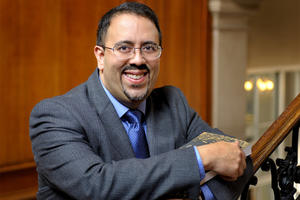When and where professional athletes have the right to voice their political opinions became an issue following comments by President Donald Trump aimed at players in the NFL. History professor Adrian Burgos Jr. focuses his research on the history of U.S. sports, specifically as it relates to minority participation in sports, with books on the history of Latinos in professional baseball. Burgos spoke with News Bureau social sciences editor Craig Chamberlain.
Many fans might like to see sports as a politics-free zone. But is that realistic?
Sports have long been political as well as the site of protests. Politics decide whether new stadiums are built, how they are funded and who profits from them. The playing of the national anthem at sporting events was a political decision. So was the decision to have all the military pageantry at NFL games, such as fighter jet flyovers, the unveiling of football-length U.S. flags during the pregame and the honoring of military veterans – a decision some NFL team owners have profited from by charging the U.S. military to host these festivities.
Politics and protests also drove the campaigns to desegregate MLB, the NFL and intercollegiate sports. Picket lines at stadiums, letter-writing campaigns to sports commissioners and university administrators, and protesters at sporting events pushed for integration. Nor should we forget the protests of those who supported segregation, who saw racial exclusion as the law, and expressed their discontent at the stadium, through letters to editors and other means.
Politics were the reason for Jackie Robinson’s last public appearance at the 1972 World Series. MLB wanted to use his presence at the ballpark to celebrate the 25th anniversary of integration, of Robinson breaking baseball’s color line, but Robinson initially refused. He insisted MLB had not done enough in making integration transformative throughout baseball, from the ballplayers to the managers and the front office.
President Trump’s recent attacks on professional athletes also included several prominent NBA players, who answered the criticism pretty directly. What should we notice in the different responses of the two leagues, their teams and players?
Trump opted to direct most of his attacks on NFL players, who are the most vulnerable professional athletes of the three major sports. When one considers economic security based on the nature of their contracts, NFL players put a lot at risk in protesting and drawing the ire of the public, the front office and politicians.
NBA players have guaranteed contracts – as do MLB players. An NBA player who signs for four years at $40 million will be paid the entirety of that contract, even if released by the team. NFL players’ contracts are not guaranteed for their salary, just the signing bonus. An NFL player who signs a similar four-year, $40 million contract with a signing bonus but who is released at any point after that is owed no salary beyond his release – or, in the case of some veterans, no salary beyond that season.
This means that an NFL player can quickly lose his livelihood. He understands that protesting can impact his earnings and career.
Most of the controversy about NFL players not standing during the national anthem actually began last fall with Colin Kaepernick, then a quarterback for the San Francisco 49ers. He became a free agent after the season, but no team has hired him. How is his case reminiscent of others in the past?
Interestingly, Kaepernick’s protest was not about his own job – about one man’s employment – but about a grave social wrong he saw happening in U.S. society: police brutality toward African-Americans. He decided to put his career on the line and use his platform as an NFL player to bring attention to this issue.
The hostilities expressed toward Kaepernick and other African-American athletes kneeling for the anthem are striking given the example, once again, of Jackie Robinson. Many of those who hail Robinson as an American hero and cite his example as the standard for all black athletes chose to ignore how Robinson closed his 1972 autobiography.
In reflecting back on integration in 1947 and where MLB and U.S. society were on racial matters in the early 1970s, the proud military veteran who engaged in public defiance of Jim Crow laws in Texas, for which he was court-martialed, stated: “As I write this twenty years later, I cannot stand and sing the anthem, I cannot salute the flag; I know that I am a black man in a white world. In 1972, in 1947, at my birth in 1919, I know that I never had it made.”
